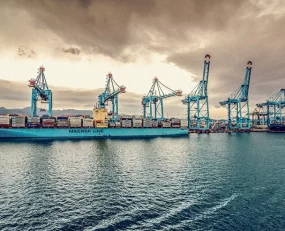
The end of the agreement shouldn’t surprise anyone. What is surprising, is that the two largest container shipping lines had such an agreement in the first place.Thomas Cullen, Chief Analyst, reports.
Maersk and Mediterranean Shipping Company (MSC) have decided to end the 2M Alliance, the capacity sharing agreement that was signed eight years ago. A joint statement from the two company’s CEOs said that, “MSC and Maersk recognise that much has changed since the two companies signed the 10-year agreement in 2015. Discontinuing the 2M alliance paves the way for both companies to continue to pursue their individual strategies.”
However, the arrangement will only be terminated on January 25th, meaning that, “today’s announcement has no immediate impact on the services provided to customers using the 2M trades. Each company’s customer teams will communicate with their respective clients to support during, and beyond, the phase-out of the 2M alliance.”
Therefore, the news ought not to affect the market and shipper’s relationship with Maersk and MSC immediately.
The fact that the two lines are ending the agreement ought not to be so surprising. What was perhaps more surprising was that the two largest container shipping lines had such an agreement in the first place. What used to be called ‘conferences’ have generally been used to improve asset utilisation within medium-sized shipping lines in order to compete with the largest providers.
The timing of the statement is however, of interest. Freight-rates are falling rapidly and the balance of supply and demand in container shipping is tilting back in favour of the shipper. In the face of this, MSC is continuing to buy vessels to expand its capacity and, presumably, gain market-share. Maersk seems to be more hesitant about this, laying more emphasis on its other businesses.
What the implications will be for other agreements such as the Ocean Alliance is unclear. It should not be immediately assumed that they will be dissolved as well. Most of the shipping lines in these agreements are smaller and they may view the alliance structures as a competitive asset. Indeed, noises from MSC suggest that a desire to compete through economies of scale is what has driven their decision to let 2M end. This might make life tougher for smaller and mid-market carriers.
Source: Ti Insight
Author: Thomas Cullen
Supply chain strategists can use GSCI – Ti’s online data platform – for key decision making.
GSCI data can help users identify opportunities for growth, support strategic decisions, help them stay abreast of industry trends, as well as understand future impacts on the industry.
Visit GSCI subscription to sign up today or contact: Michael Clover for a free demonstration: [email protected] | +44 (0) 1666 519907